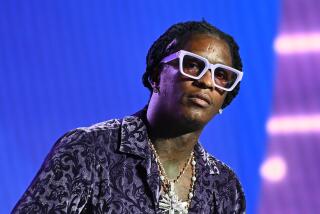Appeal on Jury Choice Delays Deaver Trial
- Share via
WASHINGTON — A federal judge Thursday ordered a three-month delay in the perjury trial of former White House aide Michael K. Deaver to allow an appeal of a decision that the closed jury selection process in the case be opened.
The postponement by U.S. District Judge Thomas Penfield Jackson followed an appellate court ruling that he had been improperly screening prospective jurors behind closed doors. The ruling against the procedure was obtained by attorneys for several reporters and broadcasters on grounds that Jackson was failing to comply with a Supreme Court decision.
The appellate court said that the Supreme Court, in a 1984 ruling involving the Riverside Press-Enterprise, virtually barred the closure of jury interviews. The high court did provide, however, that “those individuals believing public questioning will prove damaging because of embarrassment may properly request an opportunity to present the problem to the judge.”
Sensitivity Cited
Jackson had questioned most prospective jurors in private because of what he called the sensitivity of some questions that attorneys for both sides in the case wanted asked.
But, in complying with the appellate court ruling, the judge postponed the trial until Oct. 19 after dismissing all 52 potential jurors screened since proceedings began Monday. “I am now certain that many, if not all, of them have lost faith in my ability to protect their confidences,” he said.
Because a new pool of prospective jurors could not be assembled until next month, the trial had to be delayed for at least a few weeks, Jackson said. He continued the trial even further, until October, after Herbert J. Miller, Deaver’s chief attorney, said he wanted to appeal Wednesday’s jury-opening order by the U.S. Court of Appeals to the Supreme Court.
The earliest the high court could rule on the appeal is Oct. 5, when it returns from its annual summer recess, though there is no certainty about how soon it might make its ruling.
‘Paid No Attention’
Miller said the appellate court, which instructed Jackson to screen potential jurors in public except in rare instances, “paid no attention whatsoever to the defendant’s Fifth and Sixth amendment rights to select a fair and impartial jury.”
Deaver has been charged with five counts of lying under oath about his lobbying activities after resigning in May, 1985, as deputy White House chief of staff. Independent counsel Whitney North Seymour Jr. has been investigating him for potential violations of federal conflict-of-interest statutes.
Seymour objected to further delays in the trial, which earlier had been postponed for a month while Deaver unsuccessfully challenged the independent counsel’s power to prosecute him.
In that effort, Deaver’s attorneys challenged the authority of all independent counsels, who are appointed by a special federal court under the 1978 Ethics in Government Act, arguing that only the executive branch has the power to prosecute under the Constitution.
‘Ready to Proceed’
“The government is ready to proceed to trial,” Seymour said.
In announcing that he would appeal the Wednesday jury order, Miller said Deaver “seriously desires to get this case over with and behind him. He doesn’t like my decision, but he respects it.”
Among the sensitive questions that prompted Jackson to close the jury selection process were whether possible jurors had ever been victims of crime themselves and what their attitudes were toward alcoholism.
Deaver’s attorneys told the judge that they may argue that Deaver failed to recall certain facts that investigators asked him about because his memory was clouded by a drinking problem combined with prescription drugs.
More to Read
Sign up for Essential California
The most important California stories and recommendations in your inbox every morning.
You may occasionally receive promotional content from the Los Angeles Times.













